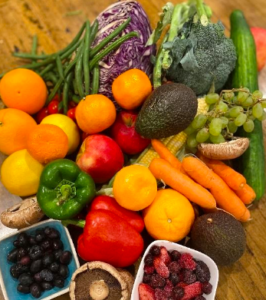Helping Children Manage Their Mood
Emma Gardiner – Graduate Practitioner 2020
The recent changes to the way our households function have brought both upsides – time to connect, tackle to-do lists around the home, and slow down a little; and challenges – disruptions to routine, frustration, and cabin fever to name a few. For households with children there is an added layer of having to support children who may be (understandably) struggling with the uncertainty resulting from recent events and the confinement of lockdown. Having focussed on stress management for adults in a previous blog we thought it time to focus on ways to help with mood management for the smaller (and maybe even the not so small) family members.
 Mood & Nutrition
Mood & Nutrition
The relationship between food and mood is a complex one but there are a few simple, well recognised principles that can be implemented to optimise the wellbeing of your children, and ultimately household peace. The following tips may help to keep children feeling more balanced physically and mentally:
Balance Blood Sugar Levels. Unstable blood sugar levels make it difficult for children to control their mood and emotions. Energy (sugar) levels in the blood are tightly controlled and when they drop the release of cortisol and adrenaline are triggered in an attempt to restore them resulting in the irritable, sometimes explosive, behaviour commonly known as being ‘hangry’.
Including sources of healthy proteins and fats with each meal (including breakfast) helps to stabilise blood sugar levels throughout the day and reduce the likelihood of the ‘hangry tantrum’ rearing its ugly head. Sugary and processed foods may rapidly (but temporarily) increase available energy but this form of energy is quickly used up resulting in an often worse drop and reaction.
Some healthy sources of protein include eggs, fish, lean grass-fed meats, chicken, quinoa, unsweetened yoghurt, cheese, soy, beans, and nuts. Healthy sources of fats include – fish, avocado, extra virgin olive oil, eggs, nuts and seeds.
Eat the Rainbow. It is well known that eating a diet high in a variety of colourful fruits and vegetables is associated with better physical and mental wellbeing. Internationally recognised and published research performed at the University of Otago found that people who ate more fruits and vegetables demonstrated higher levels of overall wellbeing, and greater curiosity and creativity.
Encouraging your kids to eat a wholefood (not processed) rainbow every day will ensure they get an abundance of the vitamins, minerals, and phytonutrients that are associated with good physical and mental health.
Modulate the Microbiome. There has been an explosion of research and information relating to communication system between the brain and the gut, known as the gut-brain axis. We now know that the gut microbiome (consisting of the microorganisms that live in your digestive system) has a significant effect on mood and mental wellbeing. Not surprisingly, a high intake of fruit and veggies helps support a healthy microbiome contributing to positive mood, while sugar and processed foods are linked to an imbalance in the microbiome.
Ensure Adequate Sleep
The importance of sleep for both physical and mental wellbeing cannot be overstated. Among the many functions that sleep is involved with are detoxification, growth, immune responses, learning and memory acquisition, and anti-stress and psychological soothing processes.
Our current lockdown situation finds many of us in the unique position of not needing to be anywhere at any specific time so routines may become a little more relaxed and bedtimes a bit blurry. This may result in sleep patterns being disturbed and a subtle, yet significant, change in the number and/or timing of hours of sleep our children are getting.
The amount of sleep a child needs changes as they get older. According to the Sleep Health Foundation the recommendations for sleep requirements according to age groups are:
| Age | Recommended |
| Newborns 0-3 months | 14-17hrs |
| Infants 4-11 months | 12-15hrs |
| Toddlers 1-2yrs | 11-14hrs |
| Pre-schoolers 3-5yrs | 10-13yrs |
| School aged children 6-13yrs | 9-11hrs |
| Teenagers 14-17yrs | 8-10hrs |
| Young adults 18-25yrs | 7-9hrs |
| Adults 26-64yrs | 7-9hrs |
| Older adults >64yrs | 7-8hrs |
A relaxing bedtime routine is one way you can help your children to get a good night’s sleep. A few relaxing activities done in the same order at the same time each night may help to establish healthy sleep patterns and promote fuss free sleep onset. A few tips that may help include:
- Avoid screens for a minimum of 1 hour before bedtime as the light they emit may interfere with the production of the sleep hormone melatonin
- A warm bath to help your child to relax
- Keeping the lights dim to encourage the production of the melatonin
- Once in bed encourage your child to read quietly or read a story together
- Relaxing music, a special calming breathing practice, or a guided sleep visualisation to help quiet your child’s mind and promote sleep. A simple search online will find many different (free) options aimed at different age groups and ranging from 3 or 4 minutes to 20 minutes.
Avoid Focussing on Current Events but Answer Questions Honestly
Your own reaction to what is going on around you will be an important factor in the way your children, both young and old, will respond. If you seem overly worried or are focussing on the difficulties of being in lockdown your children will also be focussed on this aspect and may be more predisposed to feeling anxious and frightened.
Staying up to date with the latest news may be helpful but constant exposure to this type of information can be a source of anxiety. Be mindful of when and how you are getting your updates and try to limit it to once or twice a day for your own wellbeing and that of your kids.
If your children are interested and ask questions about the current lockdown and health implications giving them simple, honest but positively framed answers that are age appropriate can help to dispel their fear and reduce anxiety. For suggestions on how you can word the information you give visit the following links provided by The Ministry of Education and The Parenting Place.
https://www.theparentingplace.com/health-wellness/how-to-talk-to-your-kids-about-covid-19/
 Foster An Attitude of Gratitude
Foster An Attitude of Gratitude
Research shows that developing an attitude of gratitude has been associated with a happier, healthier life and may help to protect against the effects of stress and enhance recovery following periods of stress. It is believed that these beneficial effects are the result of a reduction in both cortisol (a stress hormone) and inflammatory markers in the body. As an added benefit, regular expressions of gratitude have been found to improve sleep.
An easy way to instil an attitude of gratitude is to go around the table at your main meal and for each person to share one or two things that they are grateful for. This gives the opportunity for adults to model gratitude, and for children to find their voice and learn ways of expressing gratitude.
A simple addition (with added benefits) is to share a challenge that they experienced followed by a discussion on ways they could approach that challenge differently next time. This provides the opportunity for children to express issues in a constructive way and to feel heard, develop a problem-solving approach, recognise that everyone experiences challenges – they are not alone – and that there are ways to overcome them.
Other ways to incorporate gratitude into daily life include starting a gratitude journal, or for younger children drawing pictures of the things they are grateful for this day/week.
Other Tips for Creating Harmony in the Home
- Maintain regular routines – regular routines and habits reduce the number of decisions the brain needs to make which in turn results in less stress. If you haven’t already, now is a good time to agree on routines for mealtimes, bath time, bed time, and getting up in the morning.
- Maintain connections with friends & family – routines should include maintaining contact with friends and family through phone or one of the many platforms such as FaceTime, Skype, or Zoom that allow for video as well as audio. Relationships and social connection are vital to children’s wellbeing and social development and the ability to connect via technology allows children to continue to benefit from these connections and build these important skills.
- Regular exercise – for so many reasons! Apart from the many physical benefits exercise improves the emotional wellbeing of children through the release of endorphins and neurotransmitters that help them to relax, increase their appetite, and get a good night’s sleep.
- Mindfulness for minors – there is much written about the benefits of mindfulness for people of all ages, including children. In particular, mindfulness helps give children the tools and skills they need to manage stress, regulate emotions, and develop resilience, optimism, and compassion. One simple exercise you can do with your child is starfish breathing which can be found at https://www.smilingmind.com.au/.
There are many excellent online resources to help with establishing age appropriate mindfulness practices. Two that I’ve had personal experience with can be found at https://www.headspace.com/meditation/kids and https://mindup.org/
For more ideas on boredom busters and ways to occupy the children of the family check out a previous blog at this link https://www.facebook.com/search/top/?q=south%20pacific%20college%20of%20natural%20medicine%20-%20blog&epa=SEARCH_BOX
So many amazing resources have been made available for use (free of charge) during this time. Check out some ideas here https://www.rnz.co.nz/news/national/412876/coronavirus-lockdown-at-home-a-guide-to-online-resources-for-kids
And finally, but maybe most importantly, be sure to’ fill your own cup’ and ‘apply your own oxygen mask’ before trying to help others. It’s very difficult to have patience and compassion with and for your children if you haven’t applied it for yourself. At the very least it is good modelling for the people who look up to and learn from you.
Remember, we are all in this together, and this too shall pass.
References
Conner, T. S., Brookie, K. L., Richardson, A. C., & Polak, M. A. (2014). On carrots and curiosity: Eating fruit and vegetables is associated with greater flourishing in daily life. British Journal of Health Psychology, 20(2), 413–427. doi:10.1111/bjhp.12113
Health Sleep Foundation. (2020). How much sleep do you really need? Retrieved from https://www.sleephealthfoundation.org.au/how-much-sleep-do-you-really-need.html
Hechtman, L. (2019). Clinical naturopathic medicine (2nd Ed.). Chatswood, Australia: Churchill Livingstone
Jackowska, M., Brown, J., Ronaldson, A., & Steptoe, A. (2016). The impact of a brief gratitude intervention on subjective well-being, biology and sleep. Journal of Health Psychology, 21(10), 2207–2217. doi:10.1177/1359105315572455
Jerath, R., Barnes, V., & Crawford, M. (2014). Mind-body response and neurophysiological changes during stress and meditation: central role of homeostasis. Journal of Biological Regulators and Homeostatic Agents, 28(4), 545-554.
Jerath, R., Crawford, M. W., Barnes, V. A., & Harden, K. (2015). Self-regulation of breathing as a primary treatment for anxiety. Applied Psychophysiology and Biofeedback, 40(2), 107–115. doi:10.1007/s10484-015-9279-8
Mayo Clinic. (2020) Helping kids cope with the Covid-19 pandemic. Retrieved from https://newsnetwork.mayoclinic.org/discussion/helping-kids-cope-with-the-covid-19-pandemic/
Minich, D. M. (2019). A review of the science of colorful, plant-based food and practical strategies for “eating the rainbow.” Journal of Nutrition and Metabolism, 2019, 1–19. doi:10.1155/2019/2125070
Ministry of Health. (2020). Helping young children sleep better. Retrieved from https://www.health.govt.nz/your-health/healthy-living/food-activity-and-sleep/sleeping/helping-young-children-sleep-better
Murray, M., & Pizzorno, J. (2012). Encyclopedia of natural medicine (3rd ed.). New York, USA: Atria
Sarris, J., & Wardle, J. (2014). Clinical naturopathy: An evidence-based guide to practice (3rd ed.). Sydney, Australia: Churchill Livingstone
Samvat, R. & Osiecki, H. (2009). Sleep, health & consciousness. Australia: AG Publishing
The Parenting Place. (2020). Family lockdown hub. Retrieved from https://www.theparentingplace.com/lockdown-hub/
The Parenting Place. (2020). Talking to children about Covid-19. Retrieved from http://education.govt.nz/school/health-safety-and-wellbeing/pastoral-care-and-wellbeing/talking-to-children-about-covid-19-coronavirus/



